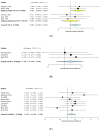Does Acute Caffeine Supplementation Improve Physical Performance in Female Team-Sport Athletes? Evidence from a Systematic Review and Meta-Analysis
- PMID: 34684665
- PMCID: PMC8538965
- DOI: 10.3390/nu13103663
Does Acute Caffeine Supplementation Improve Physical Performance in Female Team-Sport Athletes? Evidence from a Systematic Review and Meta-Analysis
Abstract
Introduction: Recent original research and meta-analyses suggest that acute caffeine supplementation improves exercise performance in team-sport athletes (TSA). Nonetheless, most of the studies testing the effects of caffeine on TSA included samples of male athletes, and there is no meta-analysis of the performance-enhancing effects of caffeine on female TSA. The aim of the present study was to synthesize the existing literature regarding the effect of caffeine supplementation on physical performance in adult female TSA.
Methods: A search was performed in Pubmed/Medline, SPORTDiscus and Scopus. The search was performed from the inception of indexing until 1 September 2021. Crossover randomized controlled trials (RCT) assessing the effects of oral caffeine intake on several aspects of performance in female TSA were selected. The methodological quality and risk of bias were assessed for individual studies using the Physiotherapy Evidence Database scale (PEDro) and the RoB 2 tool. A random-effects meta-analysis of standardized mean differences (SMD) was performed for several performance variables.
Results: The search retrieved 18 articles that fulfilled the inclusion/exclusion criteria. Overall, most of the studies were of excellent quality with a low risk of bias. The meta-analysis results showed that caffeine increased performance in specific team-sport skills (SMD: 0.384, 95% confidence interval (CI): 0.077-0.691), countermovement jump (SMD: 0.208, CI: 0.079-0.337), total body impacts (SMD: 0.488; 95% CI: 0.050, 0.927) and handgrip strength (SMD: 0.395, CI: 0.126-0.665). No effects were found on the ratings of perceived exertion, squat jumps, agility, repeated sprint ability or agility tests performed after fatigue.
Conclusions: The results of the meta-analysis revealed that acute caffeine intake was effective in increasing some aspects of team-sports performance in women athletes. Hence, caffeine could be considered as a supplementation strategy for female athletes competing in team sports.
Keywords: basketball; elite athletes; ergogenic aid; soccer; sports performance; volleyball.
Conflict of interest statement
The authors declare no conflict of interest.
Figures






References
-
- WADA . Monitoring Program. World Anti-Doping Agency; Montreal, QC, Canada: 2020.
-
- Kerksick C.M., Wilborn C.D., Roberts M.D., Smith-Ryan A., Kleiner S.M., Jäger R., Collins R., Cooke M., Davis J.N., Galvan E., et al. ISSN exercise & sports nutrition review update: Research & recommendations. J. Int. Soc. Sports Nutr. 2018;15:38. doi: 10.1186/s12970-018-0242-y. - DOI - PMC - PubMed
Publication types
MeSH terms
Substances
Grants and funding
LinkOut - more resources
Full Text Sources
Medical
Research Materials

